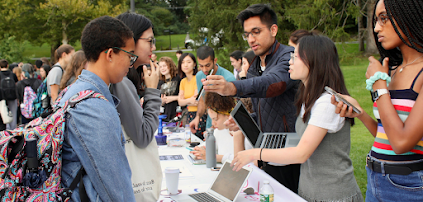Adjusting to College
Adjusting to College
College can be both an excited and nerve-racking experience all in one. You are meeting new friends, trying new things, studying for your degree all while being away from home. The biggest challenge of college is leaving your familiar world behind. You are in a new city, surrounded by new people, and learning in new ways. Your high school classroom of 20, has suddenly changed to a lecture of 300. Your house has changed into a small dorm room with roommates. Everything is suddenly different. Different is not necessarily bad, but it can be overwhelming. And the feeling is common! Navigating college takes time, but here are some ways to make it easier.
Find Your People
In college, it is inevitable that you will be meeting new people. However, your circle does not need to only be made up of your roommates or classmates. The first tip is to put yourself out there! College is a place of meeting people everywhere. Additionally, a great way to build connections is to join organizations and get involved in areas that correspond to your passions. Maybe you want to be apart of Greek life, or the robotics club, or the volleyball squad - go for it! Luckily, many colleges have Best Buddies chapters, so be sure to ask for information about joining and continuing your Best Buddies journey. These organizations are great way to network and do something you love all at once.
Learn New Ways to Study
It is likely that your classes in college will feel a lot different than grade school. You might even not preform well at first, which is completely fine. All it takes is some adjustment. Just because you mastered your high school classes does not mean you will go through college stress free. Taking good notes, studying for a couple hours a week, and attending office hours are all great ways to ensure academic success. Each university is different, so be sure to reach out to your professor or TA for more information about the resources on campus.
Put Your Mental Health First
According to the American Psychological Association, most individuals experience mental health issues for the first time within the years of 18-25. This almost directly aligns with the time you will be an undergraduate and/or graduate student. A lot of different factors can play into this including new stresses of adulthood and changes in the environment. Being aware of your well being is an important part of navigating college. Taking breaks between studying, taking time off in moments of stress, and surrounding yourself with supportive people are all ways to prioritize your mental health. Additionally, reach out to your university staff for more help. Every university has a mental health office as well as an accommodations office - and they are always there to help. Do not be afraid to reach out if you are feeling the need to talk to someone safely.
On behalf, of the YLC, we wish all current and incoming college students and amazing and safe college experience.
In Friendship,
Maya Ali



Comments
Post a Comment